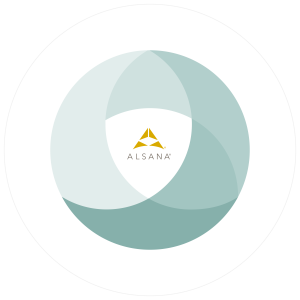Co-occurring conditions and dual diagnoses
Individuals with eating disorders often have symptoms of other conditions such as anxiety, depression, trauma, or substance abuse. While our primary focus at Alsana is to address the eating disorder, we recognize that an integrated treatment for co-occurring conditions is important for long-lasting impact towards an overall recovery.
Reach out to us today!
What Is a Co-occurring Condition?
A co-occurring condition, also known as comorbidity refers to the presence of one or more additional conditions co-occurring with a primary condition. Individuals with eating disorders often have symptoms of other conditions such as anxiety, depression, trauma, or substance abuse.
Signs and Symptoms of ED with a Co-occurring Condition
Psychological Symptoms
- Heightened levels of anxiety
- Feelings of hopelessness
- Significant and rapid changes in mood
- An increase in the use of alcohol, drugs, or other substances
Physical Symptoms
- Significant weight fluctuations
- Disturbed sleep patterns like insomnia or excessive sleeping
- Gastrointestinal issues
- Persistent tiredness or lack of energy
Behavioral Symptoms
- Avoiding social interactions or activities
- Challenges with focusing on tasks at work, school, or home
- Self-harm behaviors
Dual Diagnosis Treatment Programs
Alsana’s treatment programs offer a nurturing haven for adults struggling with an eating disorder and any co-occurring mental health challenges. Our approach is grounded in understanding and compassion, recognizing the unique journey each individual faces in their path to recovery.
Our dual diagnosis treatment is delivered by a dedicated, multidisciplinary team of treatment professionals. This collaborative team is committed to walking alongside you, offering support and guidance at every stage of your recovery journey. We understand that recovery is not a linear process, and our team is equipped to adapt to your evolving needs. We offer Residential and PHP/IOP options in Alabama, California, and Missouri, providing flexible solutions tailored to your personal recovery. For those seeking recovery within a less-structured treatment environment, our Virtual PHP/IOP programs are available and designed to motivate clients to develop their recovery skills in their own environment.

Whole-Person Approach to Treating Co-Occurring Conditions
At Alsana, we don’t just want to help clients heal from their eating disorders. We want all clients to leave treatment with the tools they need to be healthy and whole in every area of their life. Without addressing trauma, substance abuse, mood disorders, and other common co-occurring symptoms, relapse is significantly more likely. Let us help you regain balance for good.
Our approach to co-occurring conditions and treatment is rooted in reducing shame and promoting self-compassion. We understand that recovery is not just about changing eating habits; it’s about nurturing a healthier relationship with oneself and one’s body.

All of our programming is built on the foundation of our Adaptive Care Model®, an individualized, whole-person care approach for clients recovering from eating disorders and co-occurring conditions. This evidence-based method facilitates multidimensional healing through medical, therapeutic, and nutritional care, as well as through relational and movement support. This approach to eating disorder treatment helps clients hone the recovery skills needed to sustain recovery post-treatment.

Dual Diagnosis Treatment Team
Treating co-occurring conditions requires a collaborative, multi-disciplinary approach. Essential team members include:
- Dietitian experienced with eating disorders
- Psychotherapist experienced with eating disorders
- Nurse
- Medical doctor
- Psychiatrist
Additional self-care behaviors to promote health management include but are not limited to: sleep and dental hygiene, hydration, and stress management.

Eating Disorder Nutritional Care
During the assessment process, Alsana dietitians gain a thorough understanding of clients’ eating and nourishment challenges and work with our eating disorder-informed culinary team to create custom meal plans that meet clients where they are in recovery.
Dietitians also collaborate closely with Alsana’s therapeutic team to help clients heal their relationship with food and their body. In the individual and group settings, the Alsana team collaborates with each client to work toward making food choices that feel good and fuel their body without internal judgment.
Our goal is to create food neutrality by taking out the moral judgment of food and focusing on nourishment, flexibility, and pleasure in the nutritional healing process. Learn More About Alsana’s Approach to Nutritional Care ⟶
Alsana’s ED Nutrition Program
- Weekly nutrition psychoeducation group
- Nutrition education
- Hands-on experientials
- Kitchen skills
- Individualized meal plans
Health Consequences of Co-occurring Conditions
- Nutritional deficiencies
- Cardiovascular issues
- Gastrointestinal problems
- Weakened immune system
- Increased risk of substance abuse
- Heightened anxiety and depression
- Cognitive impairments
- Social isolation
- Osteoporosis
- Increased risk of suicide
Co-occurring Conditions - Statistics
- Prevalence: 55-97% of individuals diagnosed with an eating disorder also receive a diagnosis for at least one more psychiatric disorder, including mood disorders, anxiety disorders, PTSD, substance use disorders, personality disorders, sexual dysfunction, non-suicidal self-injury, and suicide ideation.
- Mental Health Impact: Individuals with anorexia are 31 times more likely to die by suicide than individuals from the general population.
- Anorexia & Comorbidity: More than half of people struggling with anorexia nervosa meet the criteria for at least one of the core DSM-IV disorders assessed in the National Comorbidity Survey Replication (NCS-R).
- Co-Ocurring Conditions: Approximately 56% of people diagnosed with anorexia nervosa, bulimia nervosa, and binge eating disorder have received treatment for emotional problems at one point or another in their lives.
Examples of Co-occurring Conditions
- Anxiety
- Substance abuse
- Post-traumatic stress disorder
- Generalized anxiety disorder
- Social phobia or social anxiety
- Pain disorder
- Other addictions
- Depression
- Obsessive compulsive disorder
- Borderline personality disorder
- Trauma related conditions
Paying for Eating Disorder Treatment – Insurance Coverage
Alsana is a preferred in-network provider for all major insurance companies.











FAQs About Co-occurring Conditions
Comorbidity, or a co-occurring condition, refers to the presence of one or more additional conditions co-occurring with a primary condition. Individuals with eating disorders often have symptoms of other conditions such as anxiety, depression, trauma, or substance abuse.
Treatment for co-occurring conditions often includes a combination of psychotherapy, nutritional education, and sometimes medication. Therapies like Compassion-Focused Therapy (CFT) and Cognitive Behavioral Therapy (CBT) are commonly used. At Alsana, we tailor our treatment plans to each individual’s needs, focusing on holistic recovery.
Absolutely. With the right treatment and support, individuals can recover. Recovery involves developing a healthier relationship with food and learning coping strategies to deal with emotional triggers.
Many insurance plans cover treatment for eating disorders. We recommend contacting your insurance provider for specific coverage details. Our staff can also assist with understanding and navigating insurance questions. You can check your coverage at alsana.com/insurance.
Yes, there are flexible treatment options available, including day treatment, outpatient programs and virtual treatment, that allow you to receive treatment while continuing with your daily life.
At Alsana, we offer a client-centered approach, integrating physical, mental, and emotional health into our treatment plans. Our Adaptive Care Model® provides a comprehensive and personalized treatment experience.
Starting treatment is a simple process. You can contact us through our 24/7 live chat or call us directly to schedule an appointment for an initial consultation to discuss your needs and treatment options. Visit alsana.com/admissions for more info.
Start the road to recovery with Alsana.









